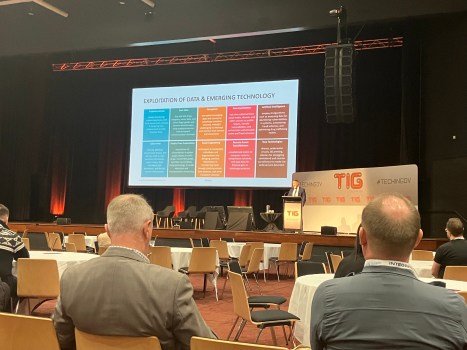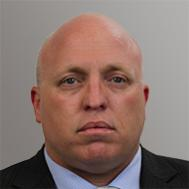Transnational organised crime knows no borders. It’s relentless and resilient, it’s both invisible and everywhere, and it’s happening at an industrial scale thanks to new technologies and big data. Is the government losing the battle?

Chris Davey is the national manager of intelligence insights at the Australian Criminal Intelligence Commission, a body with wide powers to gather and assesses information about transnational serious and organised crime, or TSOC.
TSOC is big business, encompassing the most serious crimes including drug smuggling, data theft, money laundering and online scams.
According to the Australian Institute of Criminology TSOC costs the nation $60 billion a year.
“It’s expanding its reach to all corners of the globe, it’s inflicting suffering and harm on our communities, and it’s generating mass profits,” Davey told a tech industry conference on July 23.
“It is at speed and it is at scale. We have multiple actors simultaneously coming together for multiple enterprises, and they are Increasing in efficiency and pace. It is a wicked problem, and constantly evolving and rapidly expanding technology and big data is enabling it on an industrial scale.”
More than a policing issue
TSOC is much more than a policing issue. According to Davey it’s a threat to national security and national sovereignty.

“The criminals are relentless, agile, cynical and profit driven,” he said.
“They exist for money. They adapt quickly to new markets and they profit wherever there is demand.
“They don’t have legislative constraints. Moral, cultural, societal, linguistic, legal and geopgraphic boundaries do not apply to them. They are well funded, they are extremely well resourced, and they increasingly leverage emerging technology and big data to enable their business model.”
Illegal drug importation
TSOC is driving the importation of drugs like methamphetamine, fentanyl and opium, Davey said.
In April of this year the AFP explicity linked a trend for Mexican cartels to target Australia with TSOC.
The AFP and its foreign law enforcement partners seized more than 23.6 tonnes of North American-produced methamphetamine bound for the Australian market in 2022-23, including 4.36 tonnes of methamphetamine seized in Australia and 19.33 tonnes seized offshore.
They are the original first adopters, adopting Technology faster than we can in government.
Chris Davey
In a press release issued at the time, Commander Jared Taggart said the preference by TSCO for the ‘complex concealment capabilities of Mexican cartels’ may have contributed to Australia being a target for North American-produced methamphetamine.
Davey says transnational crime syndicates operate on a business model of networking and collaboration, and use technology to ‘blend into the noise of normal commerce’.
“It reduces our ability to detect the abnormal. It blends criminality into the banal which makes it incredibly difficult for us to track,” Davey said.
Key enablers of TSOC include money laundering, identity crime and public sector corruption.
The original first adopters
TSOC criminals are the original early adopters of new technology, the Tech in Gov conference heard.
“They are the original first adopters, adopting Technology faster than we can in government,” Davey told delegates.
Cryptocurrencies are enabling money laundering and illicit transactions, with the dark web offering a criminal’s playground for anonymously selling stolen data and illegals goods and services, while encrypted apps mean communication can go unmonitored.
AI is enabling criminals to enter and exploit the supply chain, for example by altering shipping logs to defeat the ability of authorities to track goods and services.
Big data and remote access makes it easier to identify not only potential victims but corrupt insiders.

Technology means massive profits can be turned and speed and instantaneously laundered to offshore accounts, reducing the window of opportunity for law enforcement agencies to track and disrupt.
“This is happening right now, and the trend lines are pointing in the wrong direction,” Davey said.
Head of the Northern Australia Strategic Policy Centre John Coyne says technology is creating new ways to do old crimes.
“First off, they’re creating new types of criminal activity, but they’re also creating new ways of doing old crime, like fraud,” he told Government News.
“Technology is providing critical enabling capabilities to communicate, to move money rapidly across the globe without detection.”
UN Convention
Australia is one of 147 signatories to the UN Convention against Transnational Organised Crime, also known as the Palermo Convention, adopted by the General Assembly in November 2000 and supported by protocols against people smuggling, human trafficking, and trafficking of guns.
The Council of Australian Governments agreed to the National Strategy to Fight Transnational, Serious and Organised Crime (722KB PDF) on 12 December 2018, which provides a framework for governments, the private sector, civil society organisations, academia and the community to work together in combatting TSOC.
But Dr Coyne says it’s clear that current policies, strategies, laws and law-enforcement capacity aren’t stopping the growth in TSOC costs.
He says the national strategy needs updating and has called for the commissioning of the nation’s first white paper on TSOC.”
We can clearly say that the cost of transnational, serious organised crime to Australia’s community, both in terms of direct and indirect crime costs, continue to rise.
Dr John Coyne
“We can clearly say that the cost of transnational, serious organised crime to Australia’s community, both in terms of direct and indirect crime costs, continue to rise,” he says.
“What we see is a broadening of transnational serious organised crime globally, and within Australia.
“The numbers suggest that our current strategy is not preventing, mitigating or disrupting this threat.”
The national strategy lacks the granularity to really pull together the resources of states and territories and provide clarity in relation to what the priorities are, and how government aims to achieve them,” he says.
“Given the multidisciplinary nature of this challenge and its complexity, a TSOC white paper could play a crucial role in developing a whole-of-nation approach. At the very least, it would provide an opportunity to improve public policy discourse.
“Without new thinking, our current policies will not prevent TSOC costs from rising.”
Partnerships key
Davey says the best chance the government has of detecting and preventing TSOC is to identify emerging technologies and work out how they can exploited for criminal purposes.
That involves working with the tech sector.
“We need to join as a partnership, not just in the the public sector, because this issue is way beyond the public sector’s capacity to solve,” he said.
“We need to work across public and our private sectors in order to respond to this challenge, particularly its speed of its scope.”
“It’s only through cooperation, not just with agencies and jurisdictions, but across all sectors, that we can unmask the syndicates, we can reveal and track their methods and develop more opportunities to disrupt them
“We have to start engaging smarter and we have to engage with non traditional partners.”





Leave a Reply